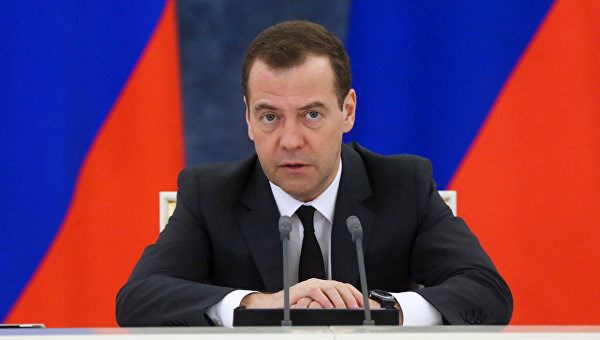Russian ex-Prime Minister Medvedev nearly disrupted Russian banking system before his resignation
Former Russian Prime Minister Dmitry Medvedev’s frantic attempts to bring national projects back on schedule in the last few weeks of December were a severe trial for the Russian banking system, and even major banks like Sberbank and VTB experienced a record number of disruptions, reports finanz.ru.
According to the Russian Finance Ministry, in order to implement the budget in December, the government had to spend 4.14 trillion rubles (around $67.3 billion), triple the average amount for the preceding 11 months. The amount included 30% of the financing budgeted for the national projects for the year.
The budget’s monthly revenue (1.3-1.8 trillion) could not cover the needed amount, and so the government had to withdraw funds from bank accounts.
As a result, state banks experienced the largest outflow of government funds in history. In one month, the Finance Ministry withdrew a record 1.5 trillion rubles from deposits and repo contracts, according to data from the Federal Treasury and assessments by Raiffeisen Bank.
Withdrawing liquidity at the end of the year is a normal practice, but the extent in 2019 was unprecedented, observes Raiffeisen Bank analyst Stanislav Murashov.
Apparently the operation was done with some urgency, and the Treasury was on the verge of a cash gap, he says. Even the Bank of Russia did not expect the surge of budget funds, and was out by more than a trillion rubles in its liquidity prediction for the end of the year (which ended up being 2.8 trillion instead of 3.6-3.9 trillion rubles).
“The thing is, the regulator predicts the movement of funds through the budget channel in cooperation with the Finance Ministry and the Federal Treasury,” Murashov explains. The fact that the Central Bank was unaware shows that the money was probably withdrawn from banks and distributed to budget recipients in an extreme hurry.
The gigantic outflow of funds caused Russia’s major banks to experience a series of disruptions. In December, Sberbank suspended payments on four occasions. On December 12, 13, 16 and 30, clients complained that their cards were not working and that they could not access online banking.
On December 11, VTB went down for several hours, and Alfa-Bank did so on December 27. According to the Higher School of Economics in Moscow, more than 80% of the budget’s free money that is placed in the banking system goes to Sberbank and VTB.
The failure of the national projects in the first year of their realization was the primary reason for the Medvedev government’s abrupt resignation, several federal officials told Forbes.
Of the 10 national development goals, for which the roadmap was signed by the former prime minister in May, at least three had failed by the end of the year. Instead of reducing the population’s natural attrition, the figure grew by 30% to an all-time record (more than 300,000 people between January and October).
Non-resource and non-energy exports, which were supposed to increase from $214 to $230 billion per year, declined to $210 billion according to the Ministry of Economic Development.
The poverty level was supposed to decrease from 12.9% to 12%, but instead, the State Statistics Service recorded an increase to 13.1%. Another 100,000 people became officially destitute, bringing the total figure to 19.2 million Russians.
Growth in the population’s real disposable incomes could only be achieved through creative manipulation of the statistics. The day before the president’s big press conference, the statistics service revised down the figures for 2018, lowering the basis for comparison and bringing the 2019 figure up from 0.2% to 0.8% (Medvedev’s plan required 0.5%).
Several Russian lawmakers told Forbes that Medvedev’s resignation came as “thunder amid clear skies”. Three days before the president’s address, the prime minister did not know anything about his own dismissal or the president’s plans to appoint Mikhail Mishustin, head of the Federal Tax Service, as the new prime minister, two federal officials told Bloomberg.
